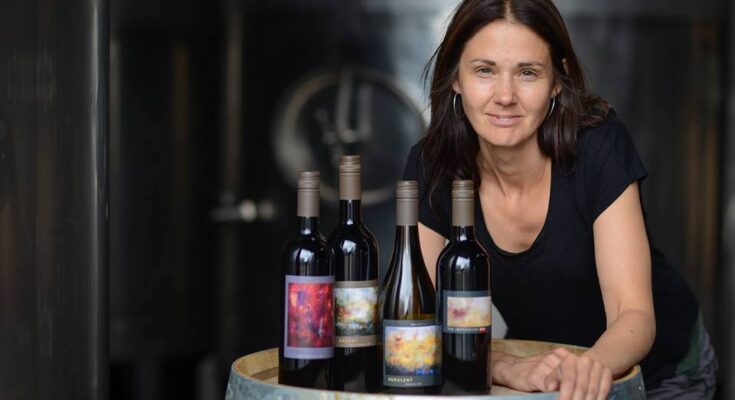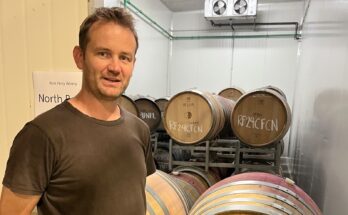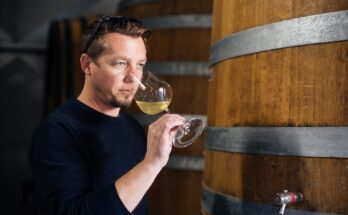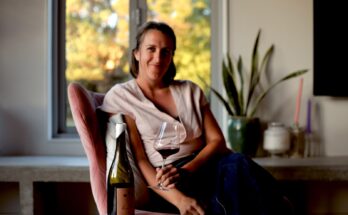Collaboration is one of those labels that I’ve had in tastings now and then; and despite being impressed by the wines, I’d never delved into the story behind the brand. I’d heard it was being made in the back of a winery, a few barrels, by a maker sourcing special patches of grapes from around Hawke’s Bay. Looking at the labels was also intriguing – is there a muse, an inspiration for this fine art, mirroring the crafted product within? Then by chance, whilst talking to Richard Painter of Te Awa, I get an introduction.. so, we now have another in our series of ‘meet the winemaker’ – Julianne Brogden.
WineFolio: What’s the background to Collaboration wines? Can I hear a bit of your back story, and what made you want to make wine?
Julianne Brogden: I was 17 years of age – just completing my last year of High School. I had no idea what I wanted to do; so I decided to follow my interests which were Horticulture, Science and the Arts. I looked at all the options, which incorporated these subjects, and the Bachelor of Wine Science seemed to cover all three, Viticulture, Wine Science and a creative side. I struggled with the first two years… questioned my decision.
The Third year of the degree I really enjoyed it. The Wine Science was really interesting.
We also had to travel around the different wine regions of New Zealand; it was the smaller producers that really got me excited. A lot of variation in the job – working in the cellar, laboratory, vineyard, bottling and sales etc. Upon graduating in 1999 I worked a couple of vintages in NZ and then travelled abroad. I had no set plans. I ended up living and working in Napa Valley, California for 8 years and I spent time down in Margaret River, Western Australia. The wineries I worked at were all small family owned wineries that were really focussed on small batches of quality of wine.
WF: How do you approach selling your brand (and wine) as an independent label – is it hard, or easier than a bigger company?
JB: For the first few years I approached Wine Stores and restaurants, I emailed people told them my story, background, sent them samples and followed up. I would do in-store tastings, wine clubs etc. I also sent my wines to wine reviewers, to get external endorsement.
My New Zealand Distributor, Dhall and Nash Fine Wines came on board in 2014. Brandon Nash one of the owners had tasted a couple of my wines at a tasting, he liked them and said small quality independent wineries were what they were looking for, for their portfolio. I have been working with them ever since 2014.
Another one of my main customers is Bill Vincent. Bill used to own an awesome little wine store in Mt Eden, Auckland. He also procures wines for a restaurant in Tokyo, Japan. The restaurant sells all New Zealand Beef and Lamb, and the Wine List is only small producers from around New Zealand. Bill came across my website and my reviews particularly the reviews by Robert Parker, The Wine Advocate, on my Cabernets. I sent samples and since 2014 my wines have continuously been on the wine list. Bill has been an extremely good customer ever since.
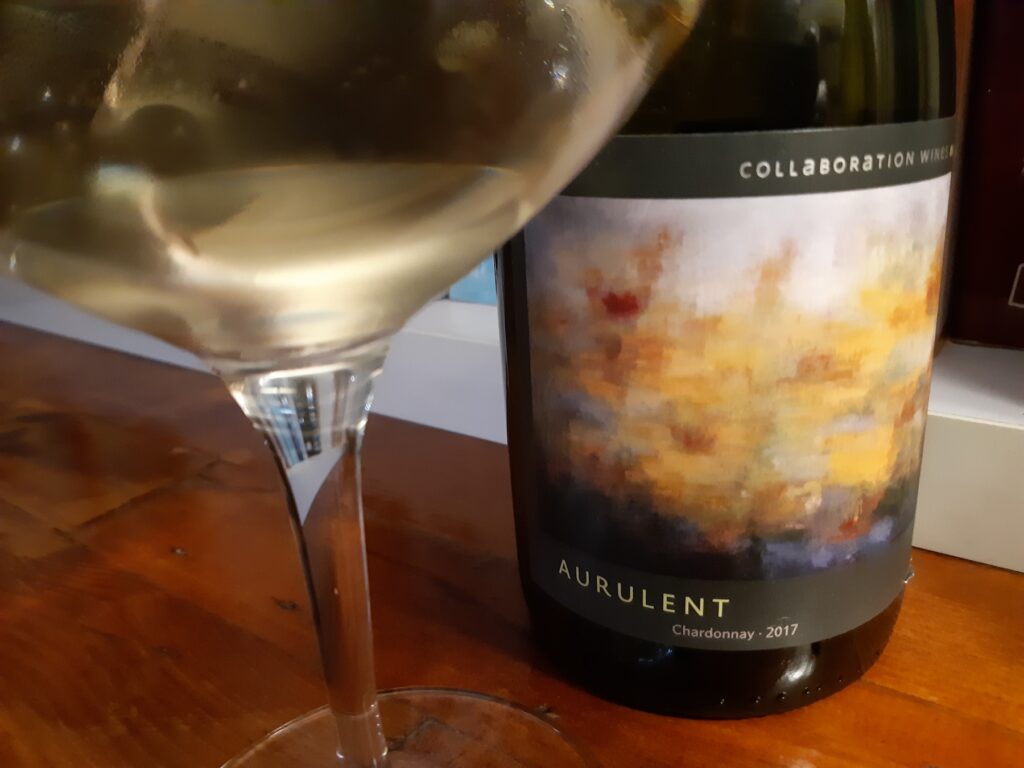
I think both small and big producers have their challenges; you just have to adapt accordingly and find what works for your business. Either larger volume, greater budget for marketing/people, sell through supermarkets, be prepared to fight the challenges with price wars etc. It’s harder to get into some restaurants because people don’t want to see something they see discounted on the shelf at the supermarket.
Or – small volumes, small marketing budget, and don’t sell in Supermarkets. Word of mouth, beating the pavement knocking on doors and slowly building up direct to consumer clientele. You really do build a brand on-premise in restaurants and bars and then flow on effect… wine stores start purchasing as people start asking for it and you start getting orders online through your website from people who have tasted it somewhere in a restaurant.
WF: What do you feel are your strengths as a winemaker, and is there anything you struggle with (or don’t enjoy)?
JB: I have worked hard to get a lot of experience and learn all facets of my job over the years while working with many great people. I think it has put me in good stead to produce my own wines.
I love everything I do, the only thing I don’t like is the long hours over vintage, I am tired of them. I want to have more of a balance during this crazy time. I want to spend time with my family and friends. Since going out on my own with Collaboration Wines, I have been able to manage this a lot better.
WF: Can you tell us a bit about your winemaking style? Do you have a signature?
JB: Elegant, complex, richly textured wines, that will continue to evolve and age beautifully. Layers of complexity and interest…. Small batches of hand picked fruit. Working in collaboration with some awesome growers from some beautiful vineyards in Hawkes Bay.
Chardonnay/Whites. More oxidative in handling. 100% Whole Bunch pressed direct to Barrel. Full solids fermentation and ageing. Minimal SO2. Unfined and minimal filtration. All French oak barrels for ageing.
Reds. 100% Whole berries, very aerative approach. Ageing for 18-24 months in French oak barrels. Minimal SO2. Bottled unfined and unfiltered.
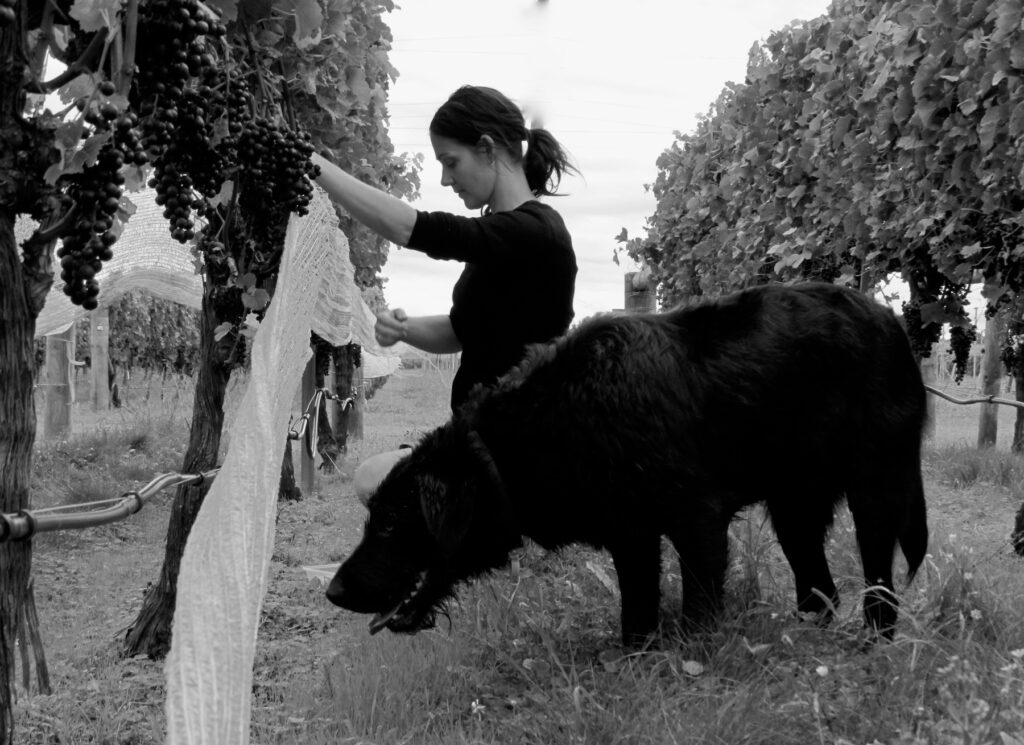
WF: What do you think of whole bunch? Wild ferments? Natural wines? Sulphur? Oak influences..
JB: Whole bunch is great. Love Wild ferments, a lot of complexity and interest. Natural winemaking if applied well, from a skilled viticulturist and winemaker, I am all for it! Sulphur – you can definitely use minimal SO2 if you understand the science of winemaking and the role of oxygen to help stabilise and naturally fine the wines. I personally like french oak. I think there is a time and place for all oak influences depending on variety and style.
WF: Do you have other wines – NZ or overseas – that you benchmark yourself against?
JB: I am always tasting and discovering new wines. I especially love learning about international wines. I’m always looking at different styles winemaking ideas, viticulture etc to keep evolving as an individual and a small producer – always comparing, benchmarking and tasting.
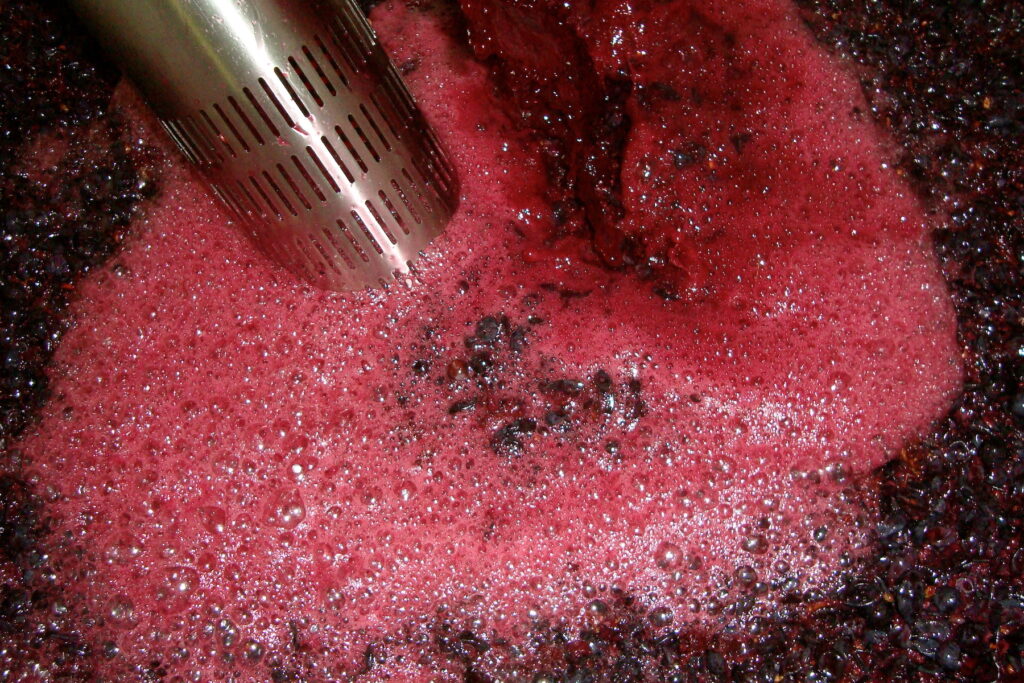
WF: Would you agree that winemaking is Scientific, or Artistic?
JB: Winemaking is definitely scientific, there is a lot of Science involved. There is also a very creative side to it, blending and crafting the wines. I also think the marketing can be very creative.
WF: Is there a moment in the winemaking year where you just ‘get a feeling’ for what’s going on / going to happen?
JB: During harvest, when you make the picking decisions you have an idea how each variety is potentially going to turn out. Then I believe around July-August, when the wines have settled down post fermentation, they have had a few months of ageing. You probably get more of a feel in comparison to other vintages of the quality then.
WF: How was the 2020 harvest with the COVID-19 restrictions?
JB: I had basically brought all my fruit in except for Cabernet Sauvignon when we went into lockdown. I am fortunate I had small volumes remaining in the vineyard. One of them was managed by a family so they were able to pick for me. I work by myself in the winery year round, so it wasn’t an issue.
WF: Are there any trends that you have you noticed – or are predicting?
JB: There are a lot more smaller producers emerging, more creativity, which is really exciting. Different varietals and wine styles appearing and reappearing. Winemaking and Viticulture has come along way in a short time in NZ and it is only going to continue to get better, especially as we get greater vine age in the vineyard. We are such a young country, compared to the rest of the world; but we have moved a long way in a short time it can only continue.
WF: In what ways do you think the NZ wine industry might be affected by Climate Change?
JB: Riper sugar levels thus a change in profile of the styles and flavours of wines, potentially. More weather extremes – continue to learn, adapt and evolve – the weather will continually challenge us. Especially when you are in a business that relies on mother nature.
WF: Someone close to you has been ‘Winemaker of the Year’ – is that tricky to put up with? (laughs)
JB: Classic, you mean the father of my little girl! Good on him!! No it is not tricky… Rich has worked extremely hard and is incredibly passionate about wine, he deserves recognition for what he has achieved over the years.

